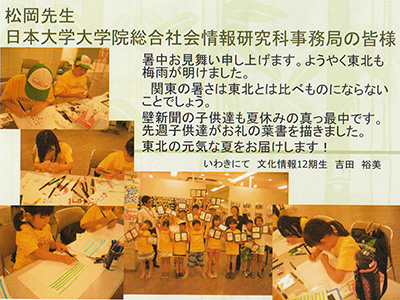Project “Sending Books to the Children of Iwaki”: http://atlantic.gssc.nihon-u.ac.jp/~gssc_alumni/project.html (accessed February 28, 2015)
 This website features an archive of correspondence – email, postal, and pictorial – between the participants of an ongoing project to send books to the children of Iwaki City. Iwaki is on the coastline of the Fukushima disaster area, about 40 kilometers from the Fukushima Daiichi nuclear power plant, and one of the worst affected sites in the region.
This website features an archive of correspondence – email, postal, and pictorial – between the participants of an ongoing project to send books to the children of Iwaki City. Iwaki is on the coastline of the Fukushima disaster area, about 40 kilometers from the Fukushima Daiichi nuclear power plant, and one of the worst affected sites in the region.
The website contains a publication called the Iwaki Tsūshin (『いわき通信 』, Correspondence from Iwaki), which is a series of reports about the social relief and youth education activities in Iwaki. Started in June 2012, a group of alumni in a program based at Nihon University’s Graduate School of Social and Cultural Studies banded together to support a classmate from Iwaki, Yoshida Hiromi, who was caught in her hometown during the triple disaster of 3.11 and remained afterward to support her fellow residents. Yoshida worked in an Iwaki supermarket while pursuing her master’s degree in early modern Japanese culture and literature at Nihon University. In the wake of 3.11, she saw that the children around her wanted stationery and reading material. Their schools were closed for months after the disaster, and many of their parents did not have the resources to purchase those things for them. Yoshida and her Nihon University schoolmates and teachers thus undertook an initiative to collect donations of books, writing and art supplies, toys and other materials for the children in her area. She also conducted educational gatherings for children to use the materials delivered to them from well-wishers.
The Iwaki Tsūshin runs from Autumn 2012 and remains current at the time of this writing through Winter 2014. An edited collection of mailing list emails transmitted amongst the Project’s members are also furnished for public viewing. Taken as a whole, many of these brief pieces are lively, yet intensely moving. They provide an intimate portrait of how one stricken community rallied together, with the help from external supporters, to locate mental and emotional relief through volunteer and educational work while under duress. This archive doubles as an ongoing monument to the grassroots socio-cultural initiatives being undertaken jointly by people in Fukushima and Tokyo, and it contains material of potential value and interest to students and scholars of relief work.
Shi-Lin Loh, Harvard University
![[Teach311 + COVID-19] Collective](https://blogs.ntu.edu.sg/teach311/files/2020/04/Banner.jpg)